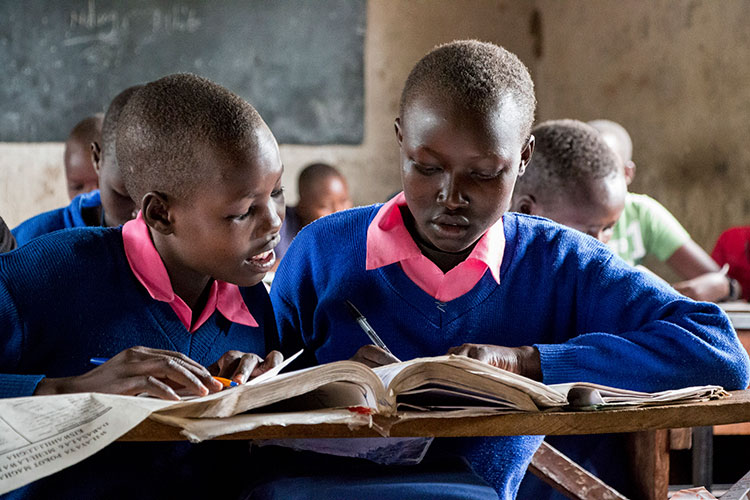Every year, there are about 12 million child brides worldwide
Early marriages are prohibited under international law because they are considered a violation of children's rights, but they remain a dramatic phenomenon, sadly widespread and difficult to eradicate. A situation often linked to poverty and gender discrimination, which harms the development of girls, denying them the opportunity to make choices about their bodies and their fate.
That is why we as ActionAid have been working on the ground for years to stop early marriages, alongside the children and girls who are at risk: we are alongside Faith, who's only 6 years old but when she will be 9, she might be given in marriage to a much older man. Her mother Pauline, who is now nineteen years old, was herself forced to become a child bride and today fears that her daughter will suffer the same fate.
We cannot allow this to happen.
DONATE TO STOP EARLY MARRIAGES
How many child brides are there?
It is estimated that today 640 million girls have been forced in an early marriage. Many of them are even already divorced or are widows.
But it does not end there: today one hundred million girls risk getting married too soon. A risk that, given the current rate of growth of the world population, we expect to increase, since the greatest population increase will take place precisely in the poorest countries.
Why do early marriages take place?
The factors that expose a girl or young girl to the risk of forced marriage are different: a family living in poverty, the mistaken perception that marriage will "protect" the child, social or religious norms, gender discrimination for which a child is considered more docile and obedient.
Are early marriages legal?
Fortunately, almost all the states of the world have already made early marriages illegal. But the law is not always respected: especially in the most isolated and rural regions, families still secretly consent to the practice of early marriages. Although the age of majority is often a requirement for marriage, in several countries the consent of parents is sufficient for a girl to be married as a child.
What are the consequences of early marriages?
Early marriages often have dangerous consequences for the health of child brides, it is enough to think of how an early pregnancy causes a high risk of mortality of young women and their newborns. Girls between the ages of 15 and 19 are twice as likely to die because of childbirth compared to women in their 20s, and babies born to such young mothers are also at risk of health.
Further consequences of this practice are social isolation, domestic violence and early school leaving.
Especially early school leaving prevents the child from being able to build her future outside the domestic sphere and be able to emerge from the spiral of poverty, to which her children will also be condemned. In addition, contracting an early marriage triples the probability that he or she will suffer violence from his spouse, compared to a married adult.
The worldwide situation
- Girl-children. Globally, the highest number of girls who are already married is found in sub-Saharan Africa. Figures say four out of ten girls get married before the age of 18, and one in eight before the age of 15.
- Teenagers. Around one in seven girls in the world (aged 15-19) is already married. In West and Central Africa the highest percentage of married adolescents (27%) are found, followed by East and South Africa (21%), the Middle East and North Africa (14%).
- Boys and teenage boys. Although less impactful than the female counterpart, the phenomenon of male child spouses also exists. It is the case for some teenage boys or children who are forced to marriage before they turn 18, often with children and girls even younger than them.
Our commitment
- Education. One of the possible solutions to this problem is the school. At ActionAid we are committed to giving girls the opportunity to continue with their studies: they will then have the opportunity to escape early marriages, through knowledge of their rights and the support of their companions and teachers, who can report these phenomena to the local authorities.
- Awareness. To stop early marriages, we need to talk to communities to let them know about the dangers that come with them. That is why we work with groups of activists and girls' clubs who have taken action to raise awareness among their community families and local leaders. In addition, we organize awareness campaigns at local, national and international level to raise awareness of this problem.
- Home return. We directly confront ourselves with those who are responsible for early marriages through our local anti-violence groups, and we even report them to the local authority to try to bring girls back to the rightful life to which they are entitled.
DONATE TO STOP EARLY MARRIAGES
The Convention on the Rights of the Child
We inspire ourselves with universally known principles: protecting the child also means protecting girls and boys against the risk of early marriages.
" States Parties undertake to ensure the child such protection and care as is necessary for his or her well-being, taking into account the rights and duties of his or her parents, legal guardians, or other individuals legally responsible for him or her, and, to this end, shall take all appropriate legislative and administrative measures."- Article 3 (2) of the International Convention on the Rights of the Child.
(Data: Who)
(Data: Unicef)

